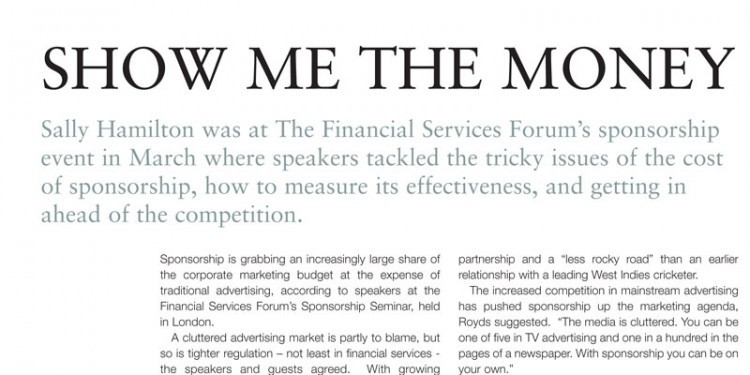Sally Hamilton was at The Financial Services Forum’s sponsorship event in March where speakers tackled the tricky issues of the cost of sponsorship, how to measure its effectiveness, and getting in ahead of the competition.
Sponsorship is grabbing an increasingly large share of the corporate marketing budget at the expense of traditional advertising, according to speakers at the Financial Services Forum’s Sponsorship Seminar, held in London.
A cluttered advertising market is partly to blame, but so is tighter regulation – not least in financial services – the speakers and guests agreed. With growing restraints on what companies can and cannot say about their products and services in advertising, corporate marketing brains are seeking out more flexible routes to their chosen audiences. By associating themselves with a glamorous or exciting event through sponsorship, companies can boost their product’s image and widen brand awareness. But where should the marketing departments direct their sponsorship efforts? Should they link up with sport, the arts or other activities and how do they judge whether the partnership works for them? Most importantly, can they afford the most sought-after partnerships such as the London Olympics in 2012?
These and other questions were dealt with by key speakers at the forum. Richard Royds, Forum member and head of retail at investment management group Merrill Lynch introduced the seminar, held in conjunction with trade body the European Sponsorship Association (ESA), with a commentary on his own firm’s choice of sponsorship deals.
These have included a successful five-year link with the Chelsea Flower Show, and its newer tie-up with Tour of Champions tennis, both of which offer corporate hospitality opportunities as well as increasing brand awareness.
“The Chelsea Flower Show was tremendously successful and enabled us to entertain clients in a ‘right royal’ style,” said Royds. “If you invited spouses then 75 per cent of people said yes to the invitation.” The flower show was considered a non-controversial sponsorship.
To read the full article, please download the PDF above.

